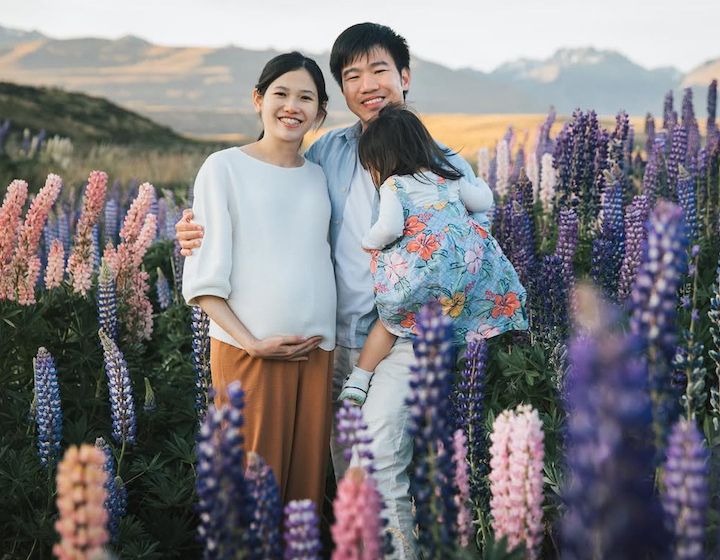
“There’s much better work-life balance and family time. It’s a dream come true, something we couldn’t afford in Singapore as average income earners.”
Singaporean parents Brandon Chia, a Nurse Educator at a public hospital, and JiarLin, a homemaker and former ICU Nurse, chat to us about life in New Zealand with their 4-year-old daughter and 1-year-old son. Although life can be challenging without their family and support network nearby, they are relishing spending more time as a family and rave about the better work-life balance and how they didn’t need to pay fees when their son was born in NZ.
Read more Overseas Family Stories here.
When did you move to NZ and what were the reasons you decided to move there?
Brandon moved to New Zealand in late 2022, and Lin and the kids joined him in early 2023 after Lin completed her work contract in Singapore. We decided to move because we wanted to spend more time with our daughter—our son wasn’t born yet at that time. Back then, we were both working as registered nurses in an intensive care unit, doing rotating shifts, which meant we had very little time together as a family. Annual leave was allocated by ballot, so if we weren’t assigned the same slot, it was hard to plan holidays.
It was also difficult for one parent to navigate public transport with a stroller during peak hours. Financially, it didn’t make sense for us to own a car in Singapore. We started looking for an “alternative” lifestyle overseas.
Since moving to NZ, our quality of life has improved. Lin is now able to stay home to care for the kids. We own a car and traded our apartment for a house with a small garden. Annual leave is easier to apply for—it’s first come, first served—and we enjoy semi-flexible working hours. There’s much better work-life balance and family time. It’s a dream come true, something we couldn’t afford in Singapore as average income earners.
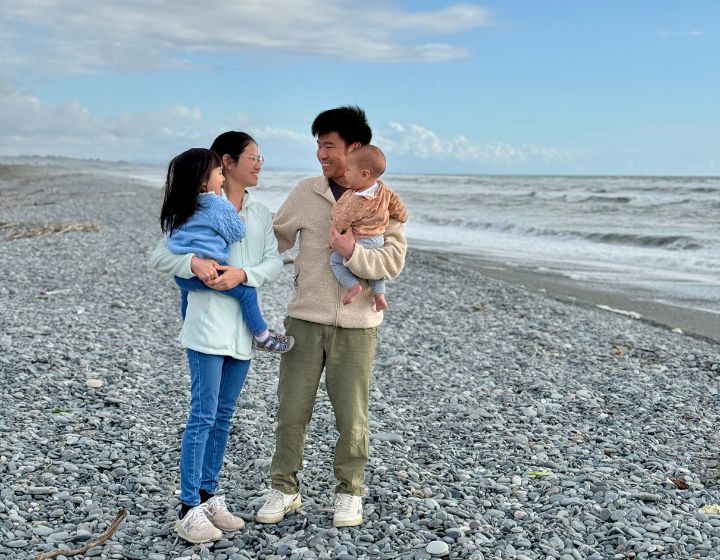
Why did you choose NZ?
It was during the COVID-19 period that there was active recruitment of ICU-trained nurses, and New Zealand offered a straight-to-residence visa pathway for nurses. We had a short holiday in New Zealand with some friends and instantly fell in love with the stunning landscapes.
One thing we really love about New Zealand is how accessible nature is. Within just a few hours’ drive, you can explore beaches, rainforests, glaciers, geothermal hot springs, and snowy alpine environments. If we were still living in Singapore, it would be financially difficult to travel abroad to see these places. But here, it’s easy to explore them by car. The kids learn so much more by experiencing these natural wonders in person rather than just reading about them in books!
Professionally, I (Brandon) saw this as an opportunity to explore a different healthcare system, and it’s been full of valuable learning experiences. Over the past 2.5 years, I’ve been fortunate to take on a senior nursing role as a Nurse Educator in acute stroke and vascular surgery.
Were there any big adjustments you had to make when you first moved to NZ?
One of the challenges we faced when we first moved here was finding a good rental home. We had to strike a balance between cost and the condition of the house. Cheaper rentals can get quite cold and damp during the cooler months, which isn’t good for our health. At the same time, we didn’t have the budget to rent a high-end place. So, we spent quite a bit of time speaking to various property agents and going through listings to find something that suited our needs.
Thankfully, our landlord—who is also a hospital clinician—was kind enough to install extra insulation for us without increasing the rent. We feel truly blessed to have been able to purchase our own property this year, as renting isn’t the most economical option in the long run.
Tip: In New Zealand, having strong afternoon sun shining into the house is actually desirable (unlike in Singapore, where we try to avoid it!). This is because sunlight helps to warm the house naturally, reducing the need for expensive heating.
We’re also very thankful for the support we received from Brandon’s church friend, Daniel, who had moved to New Zealand many years before us. He helped us with so many things—from finding affordable groceries to subscribing to cheaper electricity retailers. He even drove three hours across the mountains to help us move house!
Now, we’re paying it forward by supporting other Singaporeans and Malaysians who are new to the country.
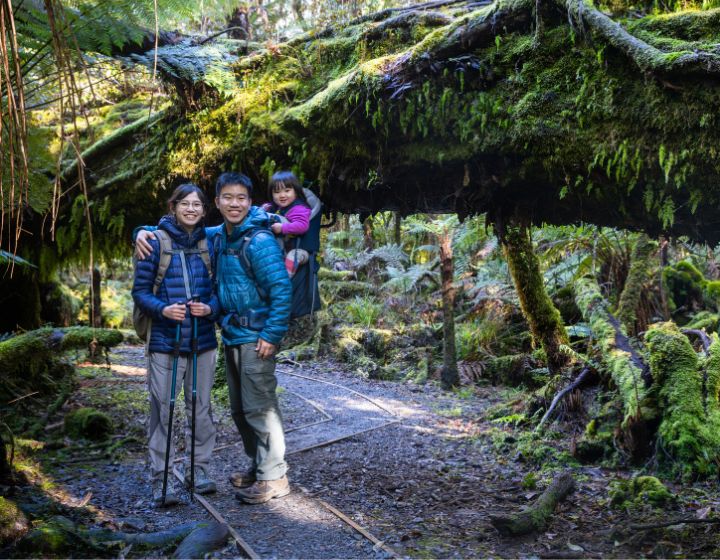
Favourite aspect about living in NZ?
Definitely the proximity to nature and experiencing four seasons. Lin and I love the outdoors—it’s just a 20-minute drive to the beach, 90 minutes to hot springs, and 2–3 hours to the Alps where we can enjoy the snow and maybe even learn to snowboard! Even short weekends are enough for a quick road trip around NZ.
And the worst part?
The time and cost involved in travelling back to Singapore or other countries due to NZ’s location. We also miss Singaporean food, though we’re thankful for a few Malaysian-Chinese restaurants in the city.
How do you think parenting in NZ differs from Singapore? What do you appreciate most about it?
There’s less emphasis on academic achievement here. In Singapore, many parents hope their children will pursue white-collar careers. In NZ, from our conversations with other parents, blue-collar jobs like builders or electricians are respected and well-paid.
We’ve also heard that the school curriculum here is not as intense. So, as Asian parents, we usually supplement with extra studies at home—like doing assessment books—but without the stress of school exams.
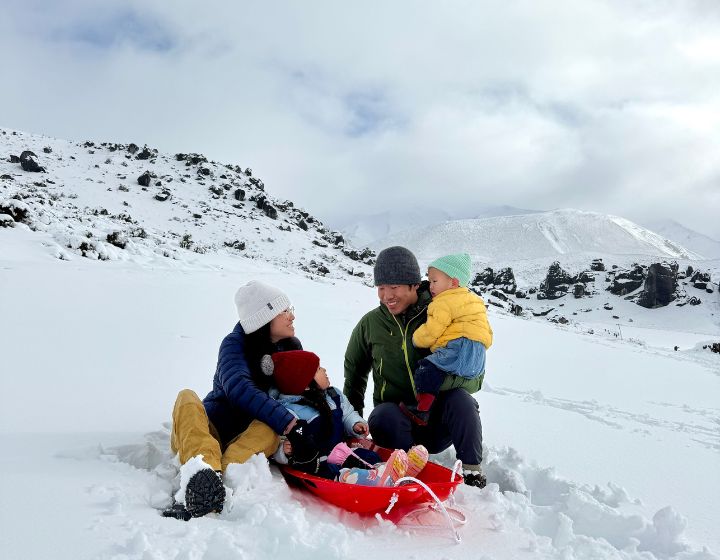
What do you find is the hardest part of being a parent living in a foreign country?
Lack of support from immediate family. However, we’re fortunate to have a lovely Singaporean-Malaysian community here. We often gather at church and have received lots of support and useful advice from them.
Your first child was born in SG while your son was born in NZ – any interesting differences in your experiences?
Very different! In Singapore, we saw a senior consultant at a public hospital. She was patient with our questions, but each consultation lasted only around 10 minutes.
In NZ, we didn’t have to pay any fees, and the main person overseeing the antenatal period was a midwife. Each session lasted an hour—the first 15 minutes were casual conversations, followed by the usual checks. O&G doctors only get involved if the pregnancy is complicated or requires medical intervention.
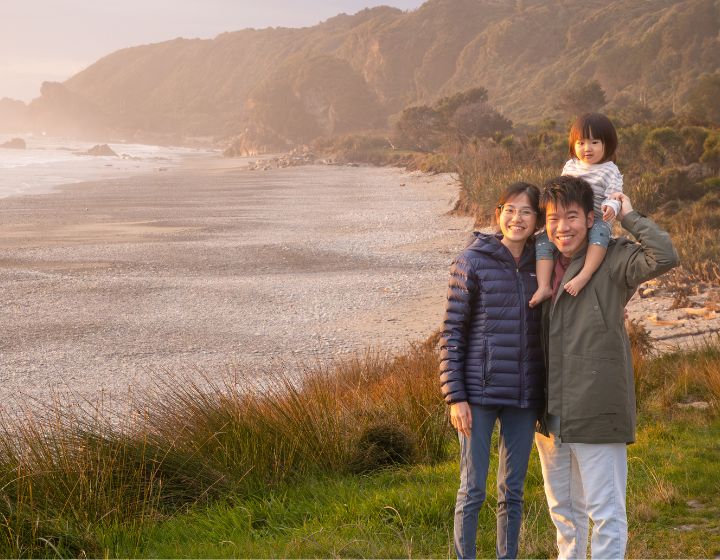
How do you and your partner juggle work and dividing up family roles?
Brandon works full-time, and Lin is currently full-time at home. So far, this arrangement has worked really well for us. It is not possible to split the workload equally. Lin does most of the housework as she’s based at home. But Brandon helps out with the housework when he’s at home because looking after the kids is a “full-time” job too! Lin tries to manage the interior of the house, whereas Brandon does the lawn and makes sure that the house exterior is well-maintained.
How did Lin navigate the decision to leave a full-time job she was passionate about to become a stay-at-home mum?
The very reason we moved to New Zealand was to escape the rat race and spend more quality time as a family. For Lin, this is a season where she wants to focus on nurturing our children, and it wasn’t a difficult decision for her. The transition wasn’t too hard, even though it goes against the Singaporean norm of having a dual-income household. We’ve also met other Singaporean families who moved here for the same reason. We’ve become close friends and continue to support and encourage one another.
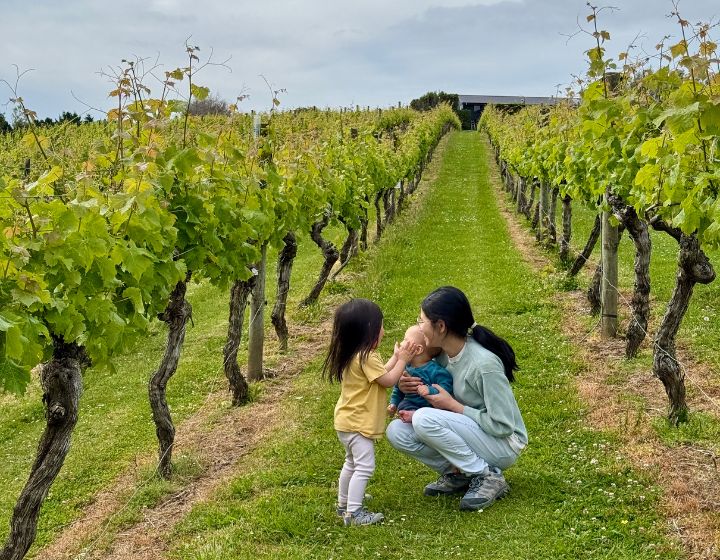
Is there something that you do to keep your children in touch with their Singaporean roots?
We speak some Singlish at home and cook Singaporean food regularly. We also regularly video call our parents so that the kids can spend some time connecting with their grandparents.
On raising multilingual children…
It’s quite a challenge, as our daughter naturally gravitates toward English because most of her preschool friends are monolingual. At home, we usually speak Mandarin, and the children’s Sunday school at church is conducted in Mandarin too.
What is the first thing you do each time you come back to Singapore?
Go on a food tour—from local kopitiams to the Takashimaya food market and Newton Hawker Centre!
What do you always bring back from Singapore for yourself and for your children?
We bring back food products that meet NZ’s biosecurity rules—like biscuits, Soup Restaurant’s samsui ginger sauce, and Yakunkaya paste.
Top five places in or around NZ you would recommend to parents travelling with kids and why.
We’re biased toward the South Island!
Christchurch: A great base for day trips to Hanmer Springs or Akaroa.
Lake Tekapo: Scenic views, hot pools, and one of the best places to stargaze.
Queenstown: Iconic destination with loads of activities and great hikes nearby.
Mt Cook: Get up close to the Alps! There are many short hikes and a beautiful campground with stunning views.
Wanaka: A peaceful alpine town, perfect for relaxing.
We often give recommendations on our Instagram based on what our followers enjoy—feel free to reach out and check out our reels!
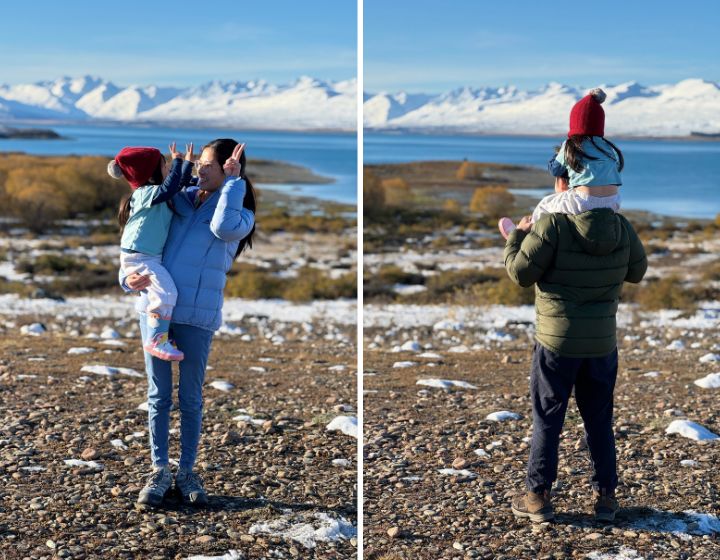
What’s the one thing you would miss about NZ if you moved away?
Being so close to nature! Even if we visit the same place, the view changes with the seasons.
Best souvenir one could bring back from NZ:
For a child: Whittaker’s chocolate
For a parent friend: Manuka honey
What do you dread and look forward to most if you were to move back to Singapore?
We’d dread the hot and humid weather. But we definitely look forward to affordable and delicious Singaporean food!
How do you think Singaporeans can benefit from living overseas?
Living abroad really broadens your perspective—from parenting styles to work culture and employer-employee relationships. In healthcare, we’ve also seen different models and approaches to nursing care.
Follow the adventures of Brandon and Lin on their Instagram @chiaseed.nz, where they share about their travels and life in New Zealand.



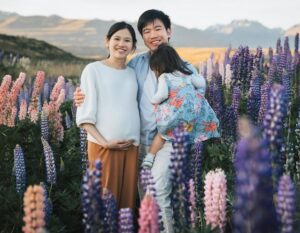

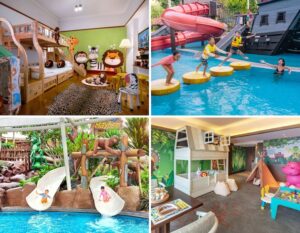
 View All
View All



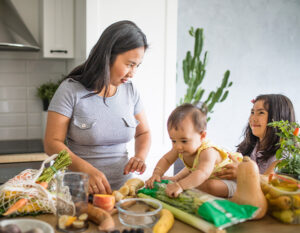
 View All
View All
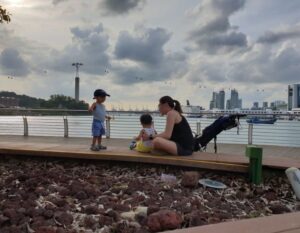


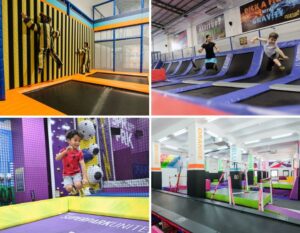





 View All
View All


![[𝗙𝗜𝗥𝗦𝗧 𝗟𝗢𝗢𝗞] 𝗡𝗮𝘁𝗶𝗼𝗻𝗮𝗹 𝗠𝘂𝘀𝗲𝘂𝗺 𝗟𝗶𝗴𝗵𝘁-𝗨𝗽 + 𝗟𝗘𝗚𝗢 𝗦𝗵𝗼𝘄𝗰𝗮𝘀𝗲 𝘁𝗵𝗶𝘀 𝘆𝗲𝗮𝗿’𝘀 𝗦𝗚𝟲𝟬! 🎆🇸🇬
The National Museum Singapore is gearing up with the biggest National Day celebration yet. And yes, it’s going beyond just waving flags and playing old songs.
Inspired by the 1987 NDP classic We Are Singapore, this year’s event is full of interactive programmes, light shows, and even a LEGO showcase.
Comment “SG60” or link in bio for more SG60 NDP events!
𝗪𝗵𝗮𝘁 𝘄𝗲 𝗹𝗼𝘃𝗲:
- Perfect evening light show for your NDP vibe post
- LEGO builds that’ll make you go “eh I remember this!”
- Interactive bits for both kids and grown-ups
- A good escape from the heat (and the malls)
𝗧𝗶𝗽𝘀 𝗳𝗼𝗿 𝗽𝗹𝗮𝗻𝗻𝗶𝗻𝗴 𝗮𝗵𝗲𝗮𝗱:
– Visit after 7.30pm to catch the full light-up display
- Come early on 9 Aug as it might get packed—there are over 20 free activities!
- Great for a post-dinner walk if you’re in the area
𝗪𝗵𝗲𝗿𝗲? National Museum of Singapore
𝗪𝗵𝗲𝗻? 18 July – 9 August 2025, 10AM - 6.30PM
𝗖𝗼𝘀𝘁? 18 July – 8 August: Free access to Stories of Singapore: Building Our Heritage, Brick by Brick LEGO showcase. Usual museum admission charges apply for other galleries.
9 August (National Day): Free admission to all galleries and programmes, including the LEGO showcase, Singapore Odyssea (new!), and Singapore History Gallery.
.
.
.
.
.
#NationalMuseumSG #CanvasOfLight2025 #StoriesOfSingapore #LEGOArtSG #ThingsToDoSG #NationalDaySG #NDP2025 #FamilyFunSG #SingaporeWithKids #ExploreSingapore #LightUpSingapore #MuseumEventsSG #FreeThingsToDoSG #NDPEvents #WhatToDoInSingapore #SingaporeEvents2025](https://www.sassymamasg.com/wp-content/plugins/instagram-feed/img/placeholder.png)
